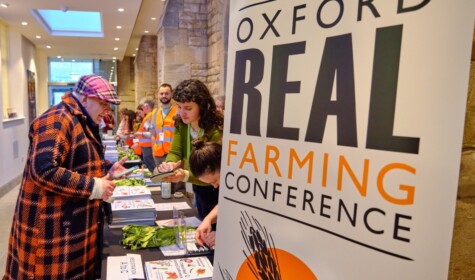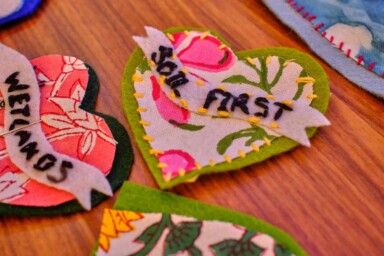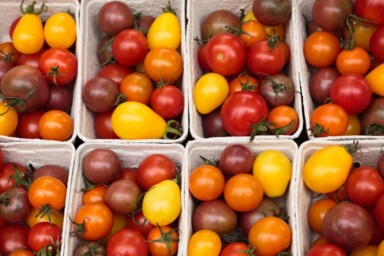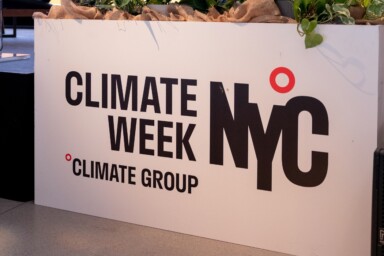SFT Content Editor, Alicia Miller, provides an overview on this year’s Oxford Real Farming Conference, including one of the SFT’s sessions, Grazing for Good, which took a closer look at the integral relationship between livestock and the biodiversity it supports.
Arriving into 2025 with the Oxford Real Farming Conference (ORFC), it has been hard to ignore what this past year has delivered in terms of climate change – 24 hours of rain in Dubai, a terrifying hurricane season in the US, fatal flooding in Valencia, Spain, heatwaves here, there and everywhere across the globe, and as an intro to the new year, Los Angeles is burning like never before. Twenty-twenty four was the hottest year on record; what will 2025 be?
So, being at the ORFC felt almost blissful – a momentary haven to talk with like-minded people and think about the micro and the macro, how we move forward in a rapidly changing new world and, most pressing, what we can do to fix it, if fixing it is even possible at this point… But hope remains our friend and that’s good to keep in mind.
As always, there was much to explore at the Conference with an array of workshops and ‘deep dive’ sessions arguably dominating the more academic talks on topics like Trauma and the Land and The Interbeing of Agroecology– not to dismiss those deeper discussions which are important to have, but perhaps ‘practice’ is having a moment? What can we do on the ground, in the day-to-day, to make change happen? Are we in a place where action speaks louder than words? That’s definitely food for thought.
In a session on Improving Food Resilience, food policy veteran, Tim Lang, discussed the findings of his recent research for the UK Government, with the panel addressing the critical question: ‘Is the UK’s food system resilient?’ Unsurprisingly, the general consensus was a resounding ‘no.’ The panel explored what resilience truly means in the context of food systems – essentially, the ability to recover from shocks, whether acute (like pandemics) or chronic (such as prolonged political instability) – and how it can be strengthened. The ‘just-in-time’ logistics employed by supermarkets faced criticism, with broad agreement that transitioning to a more localised food system could be vital to ensuring access to healthy and sustainable food in an increasingly uncertain world. Sustain’s Sarah Williams shared insights from the Local Food Plan (which the SFT is involved in), while farmer and GP Tom Pearson emphasised the importance of more farmers engaging with their local communities. The panel agreed that the proof of concept exists, but robust policy frameworks and a stronger economic narrative are needed to turn theory into action.
Following in the vein of Tim Lang’s thinking was a lively panel organised by the Eating Better Alliance. Chaired brilliantly by the organisation’s Sarah Wakefield, the panellists tackled the complex issue of dietary shift and implications for farming – a topic often mired by polarisation, which Eating Better aims to overcome. Holly Purdy’s Exmoor farm exemplifies the concept of ‘better’ meat, with her pasture-fed beef and sheep, and ‘more plants,’ through the introduction of a market garden and silvopasture incorporating fruit trees. Jimmy Woodrow at Pasture for Life highlighted the need to better account for the ecological role of livestock in regenerative food systems, a contribution that isn’t always “captured in spreadsheets,” while Julia Kirby-Smith of Better Food Traders brought in the perspectives of consumers and retailers, emphasising the system’s reliance on cheap food. Could True Cost Accounting provide the solution to rebalancing the system and demonstrate the far-reaching benefits of ‘eating better’? The discussion around barriers ranged from the lack of local abattoirs to the role of the media, and, once again, the panel agreed that getting people – whether school children or MPs – onto farms will be essential to shifting mindsets and driving real long-term change.
Also very interesting and relevant, was a session on pesticide use and its future, organised around organic beef farmer Denise Walton and mixed arable farmer Patrick Barker and how they manage their land. It was an enlightening perspective, especially from Barker, who while working hard to conserve nature on his land (and doing it very well), still uses glyphosate widely. It’s a strange disconnect – for Barker, it’s a tool and he doesn’t worry about it overmuch. But for most, if not all, agroecological farmers at the ORFC, it’s anathema. You can’t do both and his admission is at best problematic.
The Sustainable Food Trust’s session on Grazing for Good? Livestock and Biodiversity in the UK, chaired by SFT CEO Patrick Holden, included the SFT’s Senior Researcher Robert Barbour and Farmer Teleri Fielden, along with Molly Biddell, Head of Natural Capital at the Knepp Estate and Jo Riggall at Plantlife. It was an engaging discussion on the integral relationship between livestock and the biodiversity it supports. Teleri Fielden made a strong case for the role that the mixed flock of cattle that she and her husband graze in Snowdonia National Park are essential in the wider preservation of the nature they support. Practices like rotational grazing and the inclusion of more diverse swards can help to mitigate the overuse of anti-parasitic medication which has significant impact on invertebrates. The reintegration of fertility building leys grazed by animals in crop rotations also offer significant benefits in reducing agri-chemical use. And there are many more sustainable practices that work to support nature and natural habitats in a variety of ways – it is possible to have a food system that works for “people, farm animals and the natural world”. Livestock, as Molly Biddell comments, is “totally critical for the health that their meat provides [and] critical for what they do for the landscape…” The session explored many of the themes that will be covered in the SFT’s next report, due out later this year.








